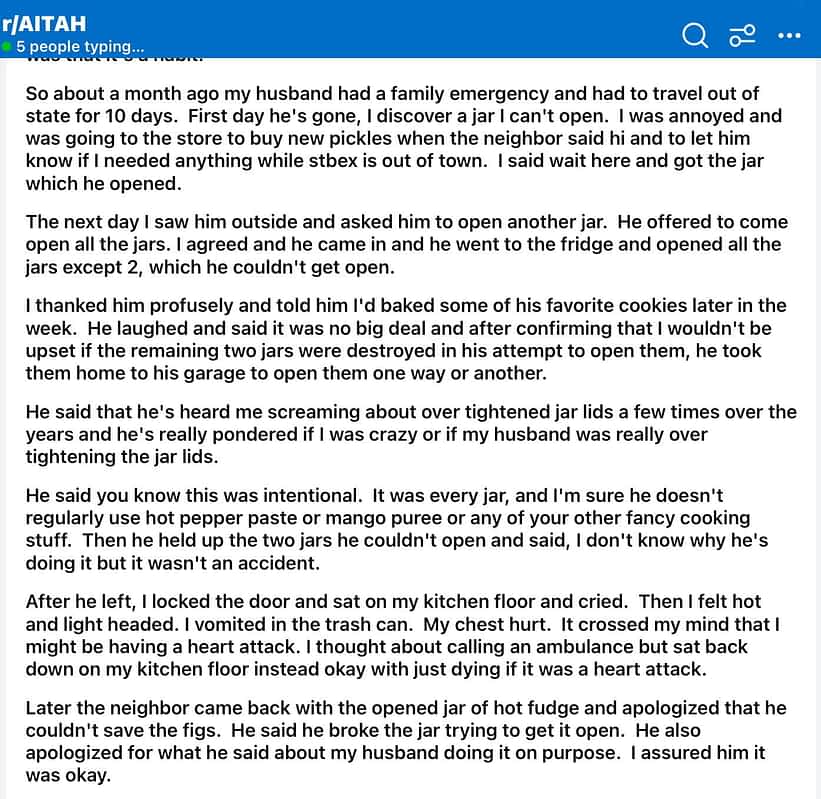7 Burning Signs of Crazy-Making Behavior in Relationships
If you’ve ever walked away from an argument thinking, “Wait… am I the problem?” when two minutes ago you were just defending your own boundaries, chances are you’ve come face-to-face with crazy-making behavior in relationships. It’s sneaky, it’s exhausting, and it leaves you spinning in a fog of self-doubt while the other person just… carries on like nothing happened.
“Crazy-making” is emotional abuse dressed in gaslighting and mind games. It’s when someone messes with your head so much, you start second-guessing your own memory, your instincts, even your sanity. One day you’re confident in what you saw or felt, and the next, you’re being dismissed and told you’re too sensitive, too dramatic, or just flat-out wrong.
This kind of manipulation isn’t random – it’s calculated. The goal is to keep control by making you feel like the unstable one in the relationship.
The worst part is it’s not always obvious. Crazy-making tactics don’t come with flashing warning signs or red sirens. They come in subtle digs, twisted conversations, and emotional whiplash that makes you question your grip on reality. One minute you’re having a normal discussion, the next you’re apologizing for things you didn’t do, while still trying to figure out what the hell just happened.
This isn’t just toxic, it’s psychological warfare dressed up as “miscommunication.”
In this article, we’re unpacking 7 of the most burning signs of crazy-making behavior in relationships; the kind that slowly chips away at your confidence, clarity, and emotional stability. We’ll also break down the difference between crazy making vs gaslighting, share real crazy-making examples in relationships, and call out the mind games for what they are.
Key Highlights:
- The subtle signs that something’s off
- Why you’re not actually losing your mind
- What makes crazy-making different from gaslighting
- Sneaky tactics that chip away at your confidence
- How to spot the cycle—and what to do when it starts again

Crazy-making Tactics Used on Me in My Relationship
After literal years of nonstop crazy-making behavior in my relationship, I finally snapped one freezing night last winter, because my husband had once again left the bathroom window wide open in the dead of winter, turning our entire house into a damn meat locker. And yes, this was after I’d spent the whole day running around trying to shut every window he’d mysteriously “forgotten” to close. Again.
I’d been asking, no, begging, him for years to stop with the windows. I’m always cold, and he knows that. But he’s obsessed with “fresh air” and “cross-breezes” like he’s trying to summon the spirit of Martha Stewart in a wind tunnel.
That night, I completely lost it. I was exhausted and furious, and I remember shouting, “Do you want me to leave?” I told him straight-up: this isn’t about air circulation: this is abuse. It’s a crazy-making tactic, designed to push me over the edge.
Guess what? After I exploded, the window nonsense finally stopped. But did the manipulative behavior end? Of course not. He just pivoted to a new flavor of crazy-making tactics, and the cycle started all over again. New issue, same exhausting game.

The Roots of Crazy-Making Behavior in Relationships
Crazy-making behavior in relationships doesn’t just pop out of nowhere. A lot of these habits start way back in childhood, when expressing emotions wasn’t exactly welcomed. If you grew up with parents who shut you down every time you had a feeling or an opinion, you probably learned real quick that being honest got you nowhere.
Being obedient kept the peace.
That’s where the dysfunction starts.
Kids who feel powerless often find little ways to take control; maybe they lie, maybe they keep secrets, maybe they manipulate situations just to feel a tiny bit safe or seen. It’s not healthy, but it’s survival. Fast-forward to adulthood, and those same crazy-making tactics that once helped them cope are now wrecking relationships.
Instead of learning how to talk things out, crazy makers default to covert manipulation because no one ever taught them how to have real, open conversations without fear of punishment or rejection. But here’s the kicker: just because someone didn’t get those tools growing up doesn’t mean they get a free pass now.
We all carry baggage. But crazy-making in relationships isn’t something you get to excuse with, “Well, that’s just how I was raised.” Nope. We’re grown. We heal, we learn, we do better, or we keep losing the people who care.
So if you’re in a relationship and someone’s constantly twisting things, dodging accountability, or making you feel like the problem, it’s time to stop accepting those excuses and start recognizing the signs of crazy making for what they are: manipulation in a grown-up mask.
We can see how draining it is to have to constantly fight the person who promised to love, honor, and cherish you, just to have comfort in your home. Can you see why so many women just say F-it and leave, seemingly out of the blue?

7 Common Crazy-Making Examples in Relationships
Let’s talk about some classic crazy-making tactics that emotionally manipulative people love to use—because once you can spot them, you can stop falling for them. These aren’t just annoying habits; they’re power plays that mess with your head and leave you doubting your own reality. Here’s what to watch out for:
🚩Gaslighting
This one’s the MVP of crazy-making behavior in relationships. Gaslighting is when someone flat-out denies something you know happened. You bring up something they said or did, and suddenly you’re “imagining things” or “misremembering.” You could have receipts, and they’d still say you’re wrong. Over time, this makes you question your memory, your instincts, and eventually, your grip on reality. Fun, right?
🚩Blame-shifting
You call them out for something hurtful, and somehow you end up apologizing. They twist everything until their bad behavior magically becomes your fault. You made them yell. You made them lie. You made them act shady. Nope. That’s classic signs of crazy making, they dodge accountability by handing you the blame like it’s a party favor.
🚩Contradictory Statements
They say one thing, do the opposite, and then deny they ever said the first thing. Or they keep changing their story until you don’t know which version is supposed to be the truth. It’s like arguing with a Rubik’s cube—except the only thing getting twisted is your sense of clarity.
🚩Denial of Abuse
Even when it’s obvious, like, super obvious, they’ll still say, “That’s not abuse,” or “You’re being dramatic.” Some will minimize it with a “It wasn’t that bad,” or “You’re just too sensitive.” This is textbook crazy-making in relationships; making you second-guess your pain so they don’t have to own their actions.
🚩Blaming
Sick of being told you’re the “irrational” one every time you bring up how you feel? Yeah, that’s not emotional immaturity, it’s manipulation. Blaming you for your natural, valid reactions is another way of silencing you and flipping the script. If everything you feel is “too much,” then nothing they do is ever enough to fix.
🚩Withholding Information
This one’s sneaky. They conveniently “forget” to tell you something important, or they leave out just enough details to keep you in the dark. Suddenly you’re confused, anxious, and questioning everything, but they swear they “didn’t lie.” And technically, they didn’t. But what they did do was create distrust. Another “classic” for the crazy-making examples in relationships all stars.
🚩Triangulation
When things get tense, they bring in a third party to take their side: your mutual friend, their mom, maybe even your own sibling. Now it’s not just you vs. them, it’s two against one. This tactic isolates you and makes you feel like you’re the problem, while they sit back and play the reasonable one.
All of these are straight-up psychological warfare. And yes, these crazy-making tactics can absolutely wreck your mental health. Over time, they wear you down until you can’t tell what’s normal and what’s manipulation. That’s not love; it’s control, dressed up in emotional confusion.
If you’re recognizing these behaviors, trust your gut. You’re not “too sensitive,” and you’re definitely not imagining things.

Crazy-Making vs Gaslighting
Crazy making vs gaslighting gets confusing because they’re closely related—but not identical. Crazy-making is the full playbook of emotional mind games, while gaslighting is just one nasty chapter in it.
Both are forms of emotional abuse, but gaslighting specifically targets your grip on reality; twisting facts, denying the obvious, and making you feel like you’re imagining everything.
In short: gaslighting is a tactic, crazy-making behavior in relationships is the entire pattern. Knowing the difference helps you name what’s happening, and once you can name it, you can stop blaming yourself for it.

The Motive for Using Crazy-Making Tactics
Interesting question. I’ve asked myself this many times.
If you’re dealing with a man who uses crazy-making behavior in relationships, know this: he’s probably not trying to push you away on purpose. What he really wants is control, to keep you off-balance and him holding the power in the relationship. But here’s the issue: all that emotional manipulation usually ends up driving you away anyway, because it’s emotionally exhausting and wears you down.
💡Here’s what’s usually behind those tactics:
- Maintaining Control: He wants you feeling dependent and unsure of yourself. A confident partner means less control for him.
- Avoiding Accountability: He flips the script and blames you for things he did, so he doesn’t have to own up to his behavior.
- Emotional Manipulation: It’s about feeling superior and powerful, and keeping you tangled up in confusion and self-doubt.
Even if pushing you out of the door isn’t his goal, the reality is that these crazy-making tactics make your relationship emotionally unbearable.

Another Real-life Example of Crazy-Making Behavior in Relationships
Is it considered crazy making when you ask someone to stop doing something innocuous like knowingly screwing the lids too tight on jars for me to open?
There was recently a post about this on Reddit. This woman was so frustrated with her husband purposely over-tightening the jars, after numerous requests not to, over the course of 5 years of dealing with this BS, she wants a divorce.
Here are some screenshots to give you an idea of how subtle, and insidious crazy making is on a relationship’s health. This highlights how insidious signs of crazy making behavior can be.

Now, check out how even the neighbor guy can see right through this BS, though he later apologized for saying something about it (possibly fearing backlash from hubby?)
This must have been rather validating for this wife to have the neighbor tell her he thought it was done on purpose.

…and finally, she breaks down again, trying to make sense of a senseless situation. Probably asking herself WHY? WHY does he DO this?
She may be berating herself for being “petty.”
Going by all the smart-assed, trying-to-be-clever, and frankly useless comments at the post, that Reddit is famous for, many others think she’s being petty as well. Which tells me, that there is so much ignorance out there on what abuse can encompass.
We can also see the mental and emotional anguish she is dealing with, as well as having to try to explain this to her friends and family. He won’t admit to over-tightening the jars on purpose. This has been going on for years, and it got to where she screamed at him about it, at certain points, out of frustration, as the neighbor said he heard.
Her clueless husband was “blindsided” by her declaration of divorce, and now she is just DONE. It’s sad because it doesn’t have to be this difficult to be married.
Some high conflict people thrive on chaos because that is all they know. It sounds like he may have tightened all the jar lids as a little middle finger to her. This is certainly about more than just jar lids, and I’ll bet if she really went back in the archives of her relationship with this guy, she’d see that there is so, SO much more going on under the surface. Hind sight will be 20/20 for her once she’s out.
Just my opinion, of course.

Yes, it can be considered one of the crazy-making examples in relationships if your partner consistently screws the lids too tight on jars despite your repeated requests to stop it. Sound petty? It’s not when you suffer from tendonitis and arthritis, which I do, making it easy for me to relate to her post.
This behavior may seem minor, but if it’s part of a pattern of disregarding your needs and making you feel incapable or frustrated, it’s a form of emotional abuse. The intent behind the action matters – if it’s done to undermine, frustrate, or belittle you, it falls under crazy-making tactics!

Extreme Crazy-Making Examples in Relationships
Now, these are more on the severe side of the spectrum to give an idea of the lengths someone will go to keep that hold of that almighty control. These examples fall on the more extreme end of the crazy-making behavior in relationships spectrum. But they’re important to mention because they show just how far he’ll go just to keep control and mess with your head.
Here’s what that can look like:
🚩Hiding Keys or Important Items
Ever spent 30 minutes tearing the house apart looking for your keys, only to find them in some random spot you’d never put them? This isn’t just you being “forgetful.” It’s a tactic meant to make you doubt your memory and feel like a mess.
🚩Changing Clock Times
They secretly reset the clocks; maybe just by 10 or 15 minutes. Suddenly, you’re late to work or showing up early and confused. It feels like a harmless prank, but it’s actually about control and psychological chaos.
🚩Messing with the Thermostat
They crank the heat when you’re not looking or make it freezing, then act like it’s been the same all day. They want to make you uncomfortable and question your own senses.
🚩Rearranging Items
Things are moved. Your coffee mug, your hairbrush, your favorite sweater… and when you ask about it, they act like you’re imagining things. This one’s classic gaslighting, used within a bigger pattern of crazy-making tactics.
🚩Subtle Sabotage
We’re talking unplugging appliances, loosening screws on furniture, or doing little things that make your day harder. Just enough to make you feel off. Like you’re the problem. You’re not.

What Crazy-Making Tactics Can Do to a Woman
Crazy-making behavior in relationships doesn’t just confuse you in the moment; it messes with your head in deep, lasting ways, and it chips away at your mental and emotional health one crack at a time.
Here’s how signs of crazy making can start showing up in your day-to-day life:
🚩You feel confused all the time.
You start second-guessing everything; what was said, what actually happened, what you felt in the moment. It’s like walking through a fog with no idea how you got there.
🚩Your self-doubt is off the charts.
Even basic decisions, what to wear, who to trust, whether your reaction was valid, start to feel overwhelming. You wonder if you’re just too sensitive or overthinking… but you’re not.
🚩Anxiety becomes your new normal.
You’re constantly on edge, waiting for the next shift in mood, the next weird behavior, or the next blame game. That unpredictability creates nonstop stress.
🚩You pull away from people.
When you’re stuck in a cycle of crazy-making tactics, you feel like no one will understand, or worse, you think maybe it is your fault. That kind of thinking can isolate you fast.
🚩Sadness starts to settle in.
After being dismissed, blamed, or gaslit over and over, it’s easy to slip into hopelessness. Depression can creep in before you even realize what’s happening.
🚩Your self-esteem takes a beating.
When someone keeps undermining you with crazy-making tactics, it’s hard not to absorb it. Over time, you stop feeling good about yourself, and start wondering if you ever really were.

How to Handle Crazy-Making Behavior in Relationships (Without Losing Your Mind)
Dealing with crazy-making behavior in relationships is no small feat. It wears you down, leaves you questioning everything, and can make even the most grounded person feel like they’re unraveling. But you’re not powerless. You can take steps to protect your peace, rebuild your confidence, and, if needed -get out.
Here’s how to start taking back control:
✔️Recognize the Behavior for What It Is
This is abuse—emotional manipulation wrapped in subtle, sneaky tactics. You didn’t cause it, and it’s not your fault. Just recognizing the signs of crazy making is a powerful first step.
✔️Educate Yourself
Learn everything you can about crazy-making tactics, emotional abuse, (and especially crazy making vs gaslighting), so you can spot the difference and name what’s really happening.
✔️Document Everything
Keep a journal or private log. Write down what was said, what happened, and how you felt. Over time, you’ll see the patterns, something abusers work hard to keep you from noticing.
✔️Reach Out for Support
Talk to people you trust: a friend, a sibling, a therapist. When you’re in the middle of crazy-making examples in relationships, outside perspective can remind you you’re not crazy, and that your feelings are 100% valid.
✔️Set Boundaries: And Hold Them
Be clear about what you will and won’t accept. You don’t owe anyone access to your mind, body, or emotions, especially someone who uses them as a battlefield.
✔️Prioritize Self-Care
This isn’t just bubble baths and yoga (though those help). It’s about rebuilding your confidence, caring for your mental health, and reminding yourself daily that you matter.
✔️Don’t Take the Bait
Abusers thrive on getting a reaction. When you can stay calm and avoid engaging in their drama, it cuts off the fuel they feed on. Raging back at an abuser can lead to reactive abuse, then he really can call you “crazy.”
✔️Seek Professional Help
A good therapist can help you untangle the damage, set boundaries, and rebuild your sense of self. You don’t have to do this alone.
✔️Plan an Exit Strategy (If Needed)
If the manipulation doesn’t stop, (and especially if it escalates) start thinking about what it would take to leave safely. Financial prep, a place to go, trusted people in the loop… whatever you need to protect yourself.
✔️Always Put Your Safety First
No relationship is worth sacrificing your peace, your health, or your safety. If the situation feels unsafe, or even just deeply unhealthy, it’s okay to walk away. In fact, it’s more than okay. It’s brave.

Wrapping Up
It’s important to understand crazy making vs gaslighting: they’re both manipulative, but gaslighting is just one piece of the bigger, messier puzzle. Where gaslighting focuses on denying your reality, crazy-making tactics go even further to confuse, frustrate, and mentally wear you down.
The goal is control and control is the root of abusive relationships. Whether it’s blame-shifting, dodging accountability, or emotional manipulation, the result is the same: you end up drained, doubting yourself, and wondering what the hell happened.
Those subtle digs and mind games may not seem huge at first, but when you start seeing these crazy-making examples in relationships for what they are, it all adds up fast. The more you recognize it, the clearer it becomes: this isn’t love. It’s control, and it comes at a cost.
Thank you for reading this post, don't forget to subscribe!







